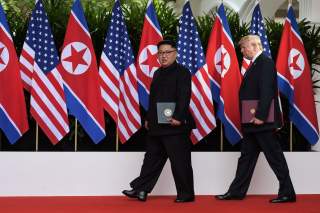The Hanoi Summit – We Asked John Nilsson-Wright What Happens Next in U.S.-North Korea Relations
"A sharp deterioration in bilateral US-North Korea ties is unlikely, although reports of preparatory work at the North’s Sohae satellite launch facility have hinted at an attempt by Pyongyang to use the implied threat of missile launch renewal to pressure Washington into adopting a more accommodating position."
Editor’s Note: Looking for more opinions on where we go after the Hanoi summit? Check out all 80 expert takes on where U.S-North Korea relations go next here.
The prospects for progress towards denuclearization and a relaxation of economic sanctions—the two primary goals of the United States and North Korea respectively—remain bleak. In the short term, both sides have reacted cautiously to the failure to reach an accord, an indication that they remain open to the idea of further discussions. However, while the post-talks remarks of both President Trump and Secretary of State Pompeo reflected a U.S. appetite for renewed dialogue, the North Koreans have been more muted, taking time to acknowledge to their public at home that the talks had failed but also underlining, via the statements of foreign minister Ri Yong-ho, that their negotiating position of seeking a partial relaxation of sanctions in return for a mothballing of their Yongbyon reactor is unlikely to change.
A sharp deterioration in bilateral U.S.-North Korea ties is unlikely, although reports of preparatory work at the North’s Sohae satellite launch facility have hinted at an attempt by Pyongyang to use the implied threat of renewed missile launches to pressure Washington into adopting a more accommodating position. Such a move would be consistent with oblique warnings made by Kim in his 2019 New Year’s address of a “new way” should the United States continue with sanctions, but it would be a mistake to read too much into this. Much will depend on Kim’s patience in seeking to deliver economic prosperity to his people and the North may seek to exploit new economic opportunities with Vietnam and China, along with its traditional means of circumventing international sanctions, rather than adopting an obviously belligerent posture.
Given Trump’s notoriously limited attention span and the risk of further domestic distractions associated with the Mueller inquiry and a widening circle of congressional investigations, the U.S. commitment to pursue further talks is likely to depend on the activism and engagement of Pompeo and also National Security adviser John Bolton. Expect too to see a renewed diplomatic effort by South Korea in facilitating track 1.5 dialogue opportunities involving America and the North (supported by European actors such as Sweden)—an area where Trump appears willing to cede some initiative to President Moon Jae-in. Ultimately there will need to be some partial relaxation of limits on humanitarian, person-to-person, and economic exchanges. This would not only restart talks but also would avoid any suggestion of a de facto U.S. acceptance of the North’s nuclear status—an outcome that would increase anxiety amongst key regional allies, South Korea and especially Japan, as well as conservative public opinion in both countries.
Dr. John Nilsson-Wright is a Senior Lecturer of Japanese Politics and International Relations at the University of Cambridge and a Senior Research Fellow for Northeast Asia at Chatham House. You can follow him on Twitter at @JNilssonWright.
Image: Reuters

